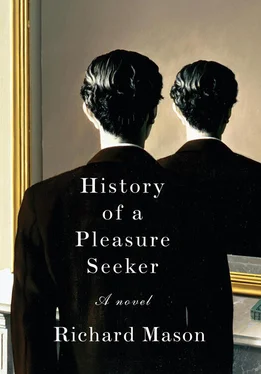Just when it seemed impossible that these sensations could improve further, Jay pulled Piet’s buttocks apart and flicked his tongue over his arsehole. This piece of daring lit a deeply buried circuit in the young man’s pleasure sensors. He opened his eyes. Rose-scented darkness and the outlines of two square pillows confronted him. He tried to speak but could find no words. Jay’s tongue pressed farther and the electric connection between them, so far transmitted by knuckles and elbows, blazed through this new synapse. Piet thought of all he had done for Jacobina, without thought of reward. It seemed he was to be repaid after all.
He was. As the orange moon sank into the sea and the sun extinguished the stars, Jay Gruneberger’s tongue overthrew the last of their mutual inhibitions and explored the unvisited places of Piet’s body to its owner’s full satisfaction. Both men, at once intimately joined and quite alone, alive in their own beings, entered into a state of rapture more profound than either had ever known.
It was light when Piet could bear it no longer, and the violence of his ejaculation was most satisfying to Jay Gruneberger. He wiped Piet down with a towel and rejoiced in what he had accomplished. Then he took off his uniform and lay down beside him.
Without exchanging a single word they fell asleep.
Jay’s cabin steward kept an extensive record of the preferences of the hundred or so passengers who requested him personally on each voyage they took and knew not to bring Mr. Gruneberger’s breakfast until rung for. Jay was woken by the heat of the sun, and for a moment his exploits hung in his consciousness like a marvelous dream. He opened his eyes. Beside him, fast asleep on his side, lay Piet Barol.
Jay got up and put on a dressing gown. The sound disturbed his companion, who stretched to his fullest extent, yawned loudly, scratched himself, and woke.
Jay’s stomach tightened. He could not bear to betray all they had shared by parting awkwardly. “Morning, Barol,” he said cheerfully. “Sleep all right?”
There was a moment’s silence. Then they both smiled and all uncertainty evaporated. Jay handed Piet a dressing gown and poured him a bath. Piet took it while breakfast was ordered and emerged to find a linen suit laid out for him beside a table set for two. He was taller than Jay, and the trousers were too short, but with a belt to hold them at the top of his hips and a sweater to disguise this arrangement he looked every inch a first-class passenger dressed for a day of elegant lounging.
“We’ll have you back in your cabin before lunch, with no one the wiser.” Jay lit a cigar. “But what of your life plans, Barol? Do you have connections in Cape Town?”
“None, I’m afraid.”
“So what will you do?”
“That question weighs on me.”
“What are you good at?”
“I can draw. It’s not much of an accomplishment.”
“That depends on how well you do it.” Jay was looking at Piet’s hands. He wanted to see them at work before they parted. “Sketch something for me.”
“What would you like?”
“A memento of our evening together.”
Piet thought for a moment, then took a sheet of ship’s notepaper and in ten minutes had caught the mahogany bed with its twisted sheets and the wily prelate who surveyed them. He signed it and gave it to his host.
“You should be an artist.”
“No money in it.”
“Then sell people things. There aren’t many who can express themselves in words and pictures, as you can. What would you like to make, or have made, that other people might like to buy?”
“Furniture, perhaps.”
“Then that’s settled. If you do it right, you can make a fortune. My wife’s decorator certainly does. Let me tell you how to make a name for yourself.”
Percy Shabrill was lying on his bunk when Piet returned to their cabin, locked in a violent interior tussle between curiosity and resentment. Resentment prevailed. He forbore from asking Piet where he had been in case this should give him an opportunity to boast of an enviable adventure. Instead he told him with studied unconcern that he had secured a further three orders for his refrigeration system. “We’ll be within sight of St. Helena by teatime,” he remarked when he had finished. “Miss Prince tells me there was a prison full of filthy Boers there during the South African War.”
“And now there’s to be a party.”
“Not for us. Harbor’s too small to dock at apparently. I’m just about sick of this bloody ship.” He yawned. “It’s only first class who’re getting off at all. Should be a jolly view if it’s not too rough.”
“Wake me to see it.” Piet turned to the wall and closed his eyes.
Piet woke just before sunset, dressed and went on deck. Percy had spent the afternoon with Miss Prince and had not thought to rouse him. Nervous with envy, clumps of tourist-class passengers were talking over the frail sound of a string quartet sent to console them. Frau Stettin had worn her best dress, which was pink and white and altogether too young for her. “Ah, the memories of my youth!” She gripped Piet’s arm to steady herself. She appeared to have drunk a quantity of champagne.
A flotilla of small white boats, each identical, was making for the ship from a long, low piece of volcanic rock floating in an endless ocean. Above it a sky shot with amber and vermilion swirled like a toreador. “Oh look!” cried Miss Prince, as the first of the sloops approached.
Jay Gruneberger gave his wife his arm. He was intensely proud of her. The spectacle of the white crafts bobbing on the sea with the sunset behind them would live on in the memory of every witness. The cheers from the third-class and steerage decks made this as plain as the sullen silence of tourist class. Even the first-class passengers, well versed in worldly delights, felt pleasant tingles of anticipation at this tantalizing overture.
Rose had interpreted la Gloire altogether originally and come as Water: glory itself, the giver of life. Her dress was a bewitching blue, deep and shifting against the expanse of the ocean with pearls sewn like bubbles in its folds. Together the Grunebergers stood out emphatically from the throng of gaudy empresses and Napoleonic generals.
Jay had long since ceased to savor the privileges of his life, but the risks Piet Barol had run in order to sample them made him appreciate them afresh. It was, after all, agreeable to be invited to a party that the world would discuss for weeks. It was agreeable always to have one’s name remembered, to be made way for, and included, and flattered, and quoted. To dance under the stars with Rose tonight and exert himself on her behalf would be splendid. He felt profoundly calm and happy.
He was turning his attention to Elizabeth Schermerhorn when he saw the blond steward who had been Piet’s constant companion. Didier was operating the tiller of a nearby cutter, his features taut and controlled. In his eyes Jay recognized at once the anguish of rejection. He was familiar with unrequited adoration and it was clear Piet might inspire it. The question was: had he returned it in this case? He thought of the young men’s familiar intimacy with each other; then of the ease with which he had persuaded Piet to spend the night in his cabin.
Jay Gruneberger had a fine instinct for human motivation, but it was obvious from Piet Barol’s stories that his matched it.
Who had been playing the more convincing game?
He had promised himself he would not look for him, but the fireworks exploding above the ship gave him the excuse to turn and he could not resist. Piet was at the very front of the crowd on the tourist-class promenade deck, between a rather plain young woman and an old lady in a bizarre confection of pink and white. He waved.
Читать дальше












